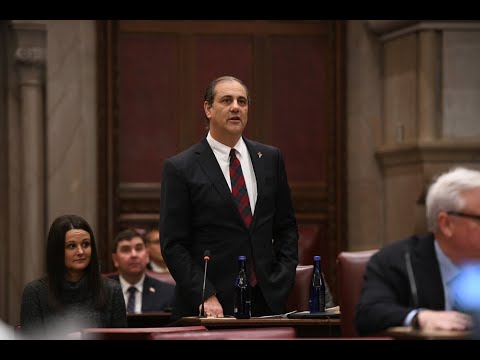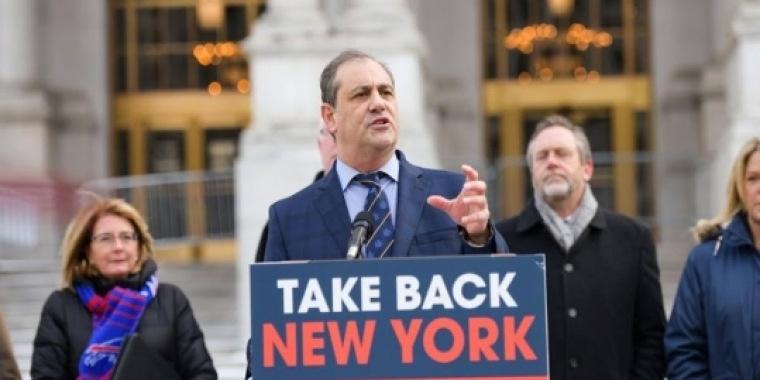
Senator Lanza Announces Passage of Bills to Close Dangerous Loopholes in Sex Offender Laws
Andrew J Lanza
February 26, 2015

Legislation Will Eliminate Gaps in Laws Created by a Recent State Court Ruling and Help Create Safer Communities
The New York State Senate today passed nine bills to close dangerous loopholes in the laws protecting children and communities from sexual predators. The measures would address critical issues raised by a recent Court of Appeals ruling that prevents local governments from enacting laws restricting sex offenders, as well as the safety concerns highlighted in a recent Senate Coalition joint investigation and report. In “Keeping Our Children Safe From Sex Offenders,” the Senate Coalition uncovered numerous instances of convicted pedophiles living within 1,000 feet of grade schools with pre-kindergarten programs or stand-alone Universal Pre-K programs.
The legislation passed today would: provide municipalities with the ability to enact local laws that strengthen sex offender restrictions; close loopholes that allow sex offenders to reside close to pre-K and kindergarten programs; prevent sex offenders from living close to elementary or high schools; decrease the potential time a sex offender could be released into the community before risk levels are determined; increase public disclosure about the residencies and workplaces of sex offenders; and prohibit registered sex offenders from living close to their victims or from entering child care facilities.
Senator Andrew Lanza said, “Today the Senate sent a message that dangerous sexual predators do not belong anywhere near schools, including pre-schools. I discovered this alarming loophole in the law last year and currently, in New York City a dozen pedophiles reside within 1,000 feet of our youngest students. I urge my colleagues in the Assembly to swiftly act on this and protect our children.”
The joint report conducted by the Independent Democratic Conference and Senate Republican Majority came on the heels of a devastating New York State Court of Appeals ruling which sided with a sex offender who completed his parole and moved within 500 feet of a Nassau County school. While his move was in compliance with state law, it was against local law, and the court ruled that only the state is authorized to create residency restrictions for sex offenders. Since the creation of the sex offender registry, many municipalities across the state have chosen to enact laws similar to the one in Nassau County that was overturned and their local authority is now jeopardized.
Bill S3925 sponsored by Senator Michael Venditto (R-C-I, Massapequa) and co-sponsored by Senator Senator Andrew Lanza would address the Court of Appeals ruling by enabling municipalities to respond to the needs of their community and create local laws relating to sex offenders. Communities would be able to put additional restrictions in place so long as they are not less restrictive than state laws.
Bill S3811 sponsored by Senator Andrew Lanza (R-I-C, Staten Island) increases the information available to the public when a convicted sex offender is in contact with the community. Level 2 and 3 sex offenders would be required to disclose their employment in addition to their residence on the state’s registry.
Senator Lanza said, “Expanding New York’s Sex Offender Registry to include the zip code of a registrant's employment will help ensure that we are providing the most accurate and up-to-date information on offenders living in the state. This important expansion is designed to make the Registry an even better resource for law enforcement agencies to monitor their communities. These are necessary additions that will help keep our neighborhoods safe and better protect our children.”
Bill S1520 sponsored by Senator Klein (D, Bronx/Westchester) addresses concerns raised by the Coalition’s joint investigation by prohibiting certain convicted sex offenders from knowingly being within 1,000 feet of any place where pre-kindergarten or kindergarten instruction is provided. The measure also requires the state Department of Corrections and Community Supervision to receive regular updates of all elementary and secondary school locations to ensure residency restrictions for Level 2 and 3 sex offenders are being followed.
Bill S22 sponsored by Senator Kenneth LaValle (R-C-I, Port Jefferson) requires schools to distribute information about Level 2 and 3 sex offenders living in a school district to parents of the students. This would give parents an extra assurance that each household has the valuable information that could protect their children from dangerous predators.
Bill S712 sponsored by Senator Tony Avella (D, Bayside) reduces the amount of time it takes to make a risk level determination for convicted sex offenders so that they are not placed on probation, discharged, or otherwise released into the community without the necessary protections and registration requirements in place.
Bill S2269 sponsored by Senator Martin Golden (R-C-I, Brooklyn) prevents convicted Level 1, 2, or 3 sex offenders from residing within 1,000 feet of a building used exclusively as an elementary or high school.
Bill S2950 sponsored by Senator Terrence Murphy (R-C-I, Yorktown) prohibits a Level 2 or 3 sex offender from residing within 1,500 feet of their victim’s residence. In Putnam County, a Level 3 sex offender was released from prison in 2011 and allowed to live next door to one of his victims, which caused significant emotional distress.
Bill S2981 sponsored by Senator Robert Ortt (R, North Tonawanda) fixes a loophole that allows sex offenders to spend significant amounts of time at a residence other than the primary one registered with the state. This measure amends the definition of a residence and requires offenders to comply with registration requirements to include any location at which the offender spends more than two days a week.
Bill S3926 sponsored by Senator James Seward (R-C-I, Oneonta) protects young children and their caretakers by prohibiting Level 3 sex offenders from entering child care facilities as a condition of their sentencing.
The bills have been sent to the Assembly.
###
Share this Article or Press Release
Newsroom
Go to NewsroomSenator Lanza Votes Against S9617
December 23, 2022



